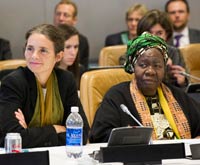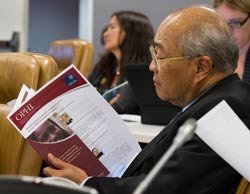Multidimensional poverty measurement in the post-2015 development context (UNGA 68)

The Multidimensional Poverty Peer Network held a special side-event to coincide with the High Level Meetings of the 68th Session of the UN General Assembly. The event addressed the future of multidimensional poverty measurement in the context of the post-2015 development agenda.
Call to action
The Network, which includes governments of Colombia, Mexico, Chile,

Philippines and Nigeria, along with the World Bank, UNDP and OECD, called upon the UN to adopt a new multidimensional poverty index (MPI) 2015+ (also described as an MPI 2.0) to track progress toward the new goals adopted after 2015. The countries and institutions gathered together:
- Recommended that the UN should adopt a new multidimensional poverty measure to complement the $1.25 a day income poverty measure, and urged the UN to adopt a new multidimensional framework for poverty reduction worldwide, as part of the post-2015 development strategy.
- Called for the breaking apart of silos on poverty reduction, and for countries and international institutions to adopt a multidimensional, multisectoral approach to poverty reduction underpinned by multidimensional poverty measures.
- Shared concrete ways in which national MPIs, whose indicators reflect national plans and country priorities, are being used for policy coordination, targeting, monitoring, and making visible real progress that income poverty measures overlook.
- Were united in their calls for better data and better measures of poverty.

At the national level, the governments of Colombia, Mexico, the Philippines, Nigeria and Chile called on other nations to embrace new multidimensional poverty measures due to their effectiveness for policy change. They stressed that it is essential to complement any international MPI with nationally adapted indices for poverty reduction. Their calls highlighted the pioneering work being undertaken by Southern nations on global poverty eradication, and the importance of South-South learning in driving change and innovation.
- Watch the video of the event
- Highlights of some of the discussion’s key points
- Download Sabina Alkire's presentation on building an MPI
- Read Guardian report on the meeting
- Press Release
Panelists at the event on 24 September included:
Multidimensional measures help us understand the interconnected factors that constitute people’s experience of poverty and enable policymakers to identify and address overlapping deprivations more effectively.
Data shows that people who are multidimensionally poor are not necessarily income poor. By adopting a multidimensional poverty measure to support the post-2015 development goals, we can incorporate the participatory insights of those living in poverty and ensure we eradicate both multidimensional and income poverty.
This event was organised by the German Ministry for Economic Cooperation and Development, CONEVAL of Mexico, the Department for Social Prosperity of Colombia, the Oxford Poverty and Human Development Initiative at the University of Oxford (OPHI) and the new Multidimensional Poverty Peer Network, a global network of policymakers dedicated to advancing the multidimensional measurement of poverty and improving poverty reduction efforts.
Photos by: Christine Butler












